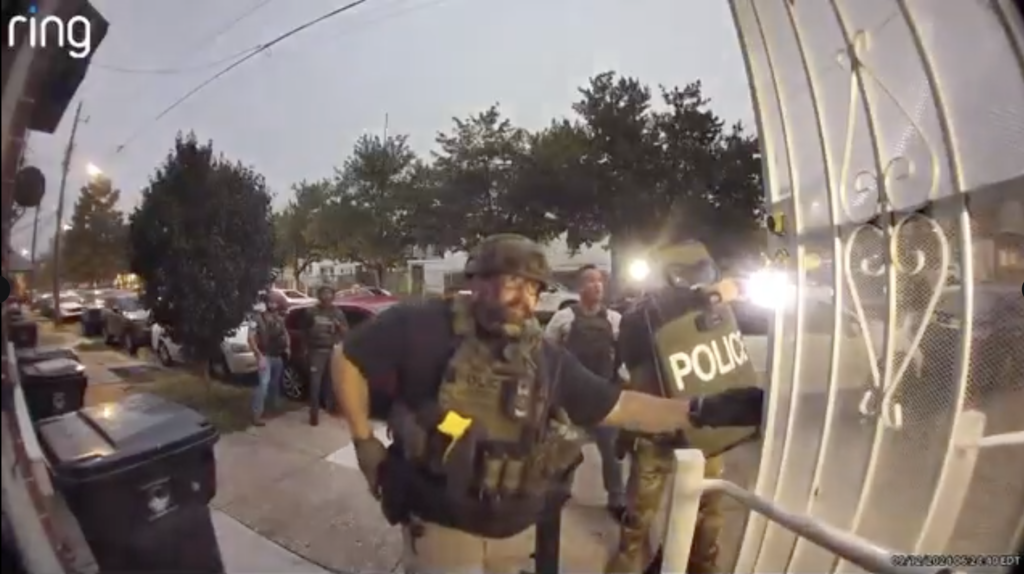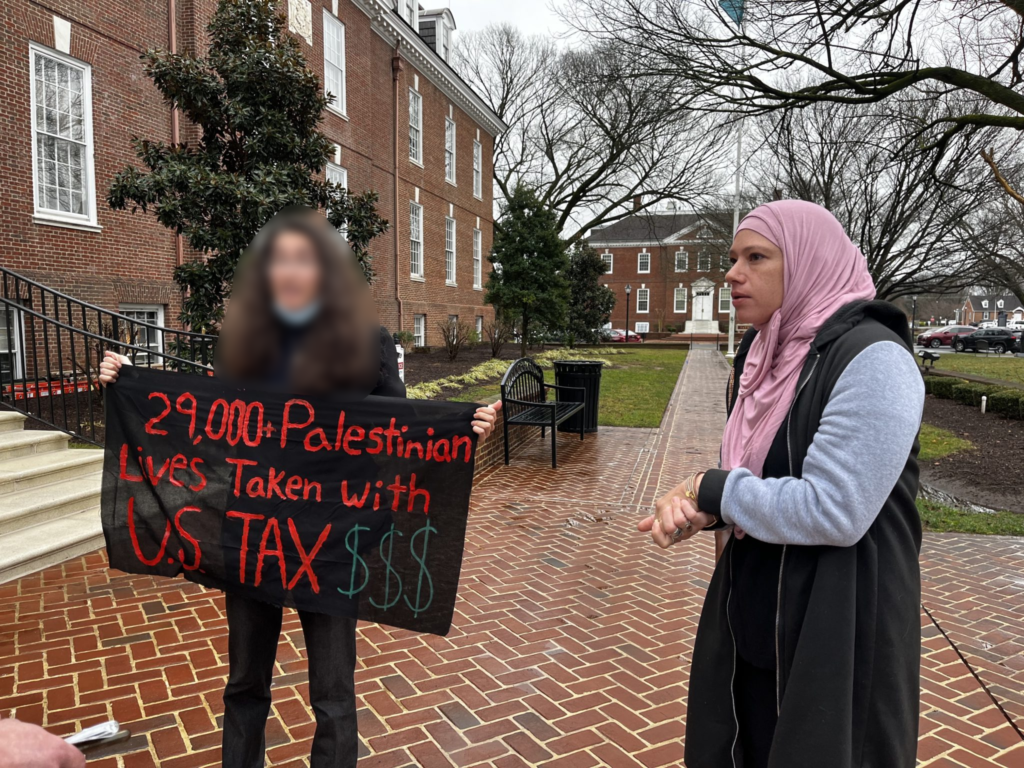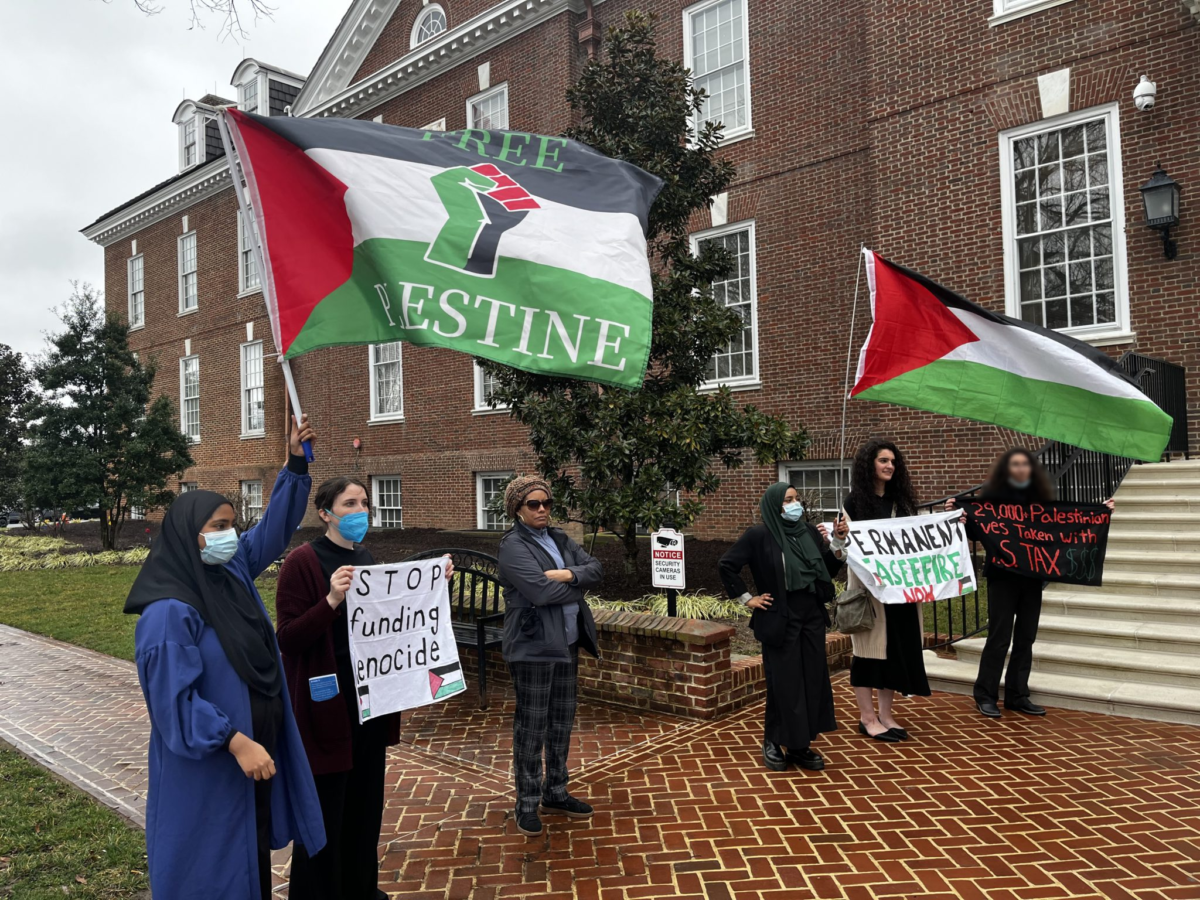Editor’s Note: Original photos for this story featured activist Dounya Ramadan. Since these photos were taken, Ms. Ramadan has decided to wear the hijab and cover her hair in public. The Delaware Call has agreed to slightly blur the original images out of respect for her religious choice. This does not imply she was not present as a participant in the 2024 action at Leg Hall.
When Michaelena DeJesus spoke out to protest Israel’s invasion of Gaza during then-Gov. John Carney’s State of the State speech one year ago, little did she know that her disruption, which lasted about 38 seconds, would mark the beginning of a state police investigation into her political activism that would eventually culminate with a 6:00 a.m. wake-up raid on her residence. The state claimed DeJesus was a violent political activist who attacked Carney’s security detail, but the charges proved bogus. DeJesus fought the state in court, and she won a partial victory last week.
DeJesus is well known for her political activism, having co-founded 302 Guns Down after gun violence spiked in Wilmington back in 2015, turning a social media hashtag into a grassroots organization. The News Journal ran a profile about DeJesus and her anti-violence activism, hailing her as a changemaker who “hopes to bring in people who wouldn’t normally gather for a peace rally, show adults that there are ways for them to get better jobs, and provide children and teens with activities to get them off the streets.”
DeJesus has always been feisty and outspoken, which shines through in her preference for direct action over empty rhetoric. After the disruption at Carney’s State of the State speech, DeJesus then tried to attend his campaign announcement for mayor of Wilmington but was turned away, and she left without incident. She next encountered Carney at a Pride event in Tilton Park, where the two had a heated — but apparently fair — verbal exchange that ended with his security detail accosting DeJesus. The state police later claimed she was the aggressor, but multiple videos of the encounter prove otherwise (and one of those officers, Helen Zane, was previously named in a federal lawsuit that alleged state and local police officers fabricated evidence for an arrest in Dewey Beach).
As DeJesus sought to engage Carney about his position on Israel’s bombardment of civilians in Gaza, the Executive Protection Unit within the state police was actively profiling her as a threat to the governor, and as evidence they pointed to lawful political activism. More than two months after her three encounters with Carney, officers surrounded her residence in Wilmington on the morning of Sept. 12, 2024, while she slept inside with her mother and three children. Despite her reputation as a non-violent peace activist, surveillance video shows police banging on her front door with guns drawn.
“What is happening?” she asks, opening the door and sounding confused.
“Hands,” they yell. “Put them out!”

Police apprehended DeJesus on multiple warrants related to her pro-Palestinian activism, two of which she claims to never have been made aware of, including one from a protest in Pennsylvania where she was detained for 24 hours and then released without seeing a judge.
Police and court documents related to her interactions with law enforcement last year shows the state’s case against DeJesus was anything but routine. Although DeJesus was never charged with any crimes during her three encounters with Carney, those instances were nonetheless documented by the state in “multiple intelligence briefs” and then retroactively included in charges against her months later — only after she was arrested for the first time June 30, 2024 in Dover on the last day of the legislative session, according to a dossier of reports compiled by the state police and reviewed by Delaware Call and the NOCAP team. DeJesus was stopped several times and then removed from the building while trying to speak to Sen. Elizabeth Lockman before session began that day.
Michaelena didn’t know it, but in the eyes of the Carney administration, she’d become Public Enemy Number 1.
Why is Delaware targeting a pro-Palestinian activist?
“We must not be complicit in genocide!” DeJesus called out in Legislative Hall, approximately five minutes into Gov. Carney’s final State of the State speech on March 5, 2024.
“What’s falling from the sky? Dinner or bombs?” she continued. “You cannot be the aid and the ammo!”
Carney stopped speaking as then-Speaker of the House Valerie Longhurst banged the gavel behind him.
“Order!” Longhurst yelled. “Point of order. Please —” but she couldn’t muster the words. A protester had disrupted the State of the State for the first time in living memory, and the Democrats looked embarrassed.

Moments later, DeJesus was approached by security and asked to leave. She complied and was escorted out of the building, but that didn’t make much of a difference for Carney. The event was disrupted several more times by even more pro-Palestinian protesters, who all took turns interrupting the governor’s speech to denounce Israel’s invasion of Gaza. Delaware Call was in Dover covering the event when we heard DeJesus’ protest echoing inside Legislative Hall, and moments later we saw police escorting her out of the building. The protest was peaceful and no activists were arrested.
DeJesus attempted to enter Carney’s campaign kickoff event for mayor of Wilmington at Delaware Technical Community College a few weeks later on April 29. She registered for the event using her full name; however, after entering the event location, she was stopped by three men who identified themselves as event security, state police, and a staffer from the governor’s office. She would not be allowed to enter, they informed her, and escorted her out of the building, again without incident.
During these encounters, DeJesus’ activism was outwardly treated by Carney and state police as little more than a nuisance. She was a boisterous protester, but hardly a serious threat. Even then, however, police were beginning to gather intelligence that they would eventually use against her in a criminal trial, even though she had not been charged with committing any crimes.
On June 22, 2024, DeJesus encountered Carney yet again, this time at a Pride event in Tilton Park on Wilmington’s west side. Carney and DeJesus exchanged words when he initially entered the park and then again when he was leaving. According to a video of the encounter shared with Delaware Call, Carney appears to grow agitated when DeJesus presses him to explain his support for Israel’s invasion of Gaza, and at one moment even said, “Do you want to have a talk? Or do you want to have a fight?”
A shocked DeJesus replied, “Do I want to fight? Is that what you want to do?
“No, we are not going to fight,” Carney responded.
“I’ll protest at your house. That’s how I fight back,” DeJesus said defiantly.

Her exchange of words with the governor continued as he and his entourage left Tilton Park. Then as DeJesus, standing several feet away from the governor, sought to question him once more, a plain-clothes state police officer with the Executive Protection Unit pushed past her from behind, outside her line of vision. According to video of the encounter reviewed by Delaware Call, when DeJesus felt herself being pushed, she instinctively put her arms out in an apparent act of self defense, apparently unaware that the person accosting her was a plainclothes state police officer.
When interviewed about the event later that day, Carney’s security detail claimed to have announced themselves as officers during their encounter with DeJesus and that their badges were visible on their belts. However, video footage of the event shown in court tells a different — almost completely opposite — story. No badges are visible during the encounter, and the officer who accosted DeJesus did not immediately identify himself as law enforcement.
After her encounter with Carney and his security detail in Tilton Park, DeJesus returned to the table where she and fellow pro-Palestinian activists were speaking with neighbors about the war in Gaza. She stayed until the end of the event and was never contacted or questioned by law enforcement about what happened that day.
Enemy of the state
DeJesus was not initially charged with any crime during the Pride event in Tilton Park, just as she was not charged at any previous protest involving the former governor. Nevertheless, according to the dossier of reports compiled by the state police, DeJesus had been under investigation for months.
“Suspect Michaelena DeJesus has been the subject of multiple intelligence briefs,” where up-to-date photos and “her pedigree information was disseminated to the members of the Executive Protection Unit,” reads one report from the dossier.
Why was DeJesus, a peace activist, targeted by police?
“These intelligence briefs are meant to notify the Troopers tasked with the Governor’s personal security of individuals who pose a potential risk of physical harm to the Governor, his staff, or the Troopers assigned to the protection detail,” the report continues.
In addition to the intelligence briefings, the dossier also reports that state police identified DeJesus based on past interactions, including the State of the State speech and the former governor’s campaign announcement for mayor of Wilmington one month later.
“This indicates that not only the Governor’s staff is familiar with Suspect Michaelena DeJesus but that she is familiar with the Governor’s staff,” the dossier reads, and refers to her as “the primary agitator at both events.”
In some places, the contents of the dossier go beyond factual descriptions of DeJesus’ interactions with the former governor and delve into speculation about her religious conversion to Islam, which one witness claimed to have “radicalized” her. The report even included speculation that her interaction with Carney would deter potential vendors from attending the Pride event next year. One supposed “witness” did not even see or hear the events, but reportedly spoke with others later about what happened, and then, as if playing the telephone game, relayed that information to the police.

DeJesus was charged months later with “disorderly conduct” and “offensive touching” against the state police officers assigned to Carney’s security detail that day in Tilton Park. After weeks of legal delays, she finally had a chance to clear her name in court. Before a jury in the Court of Common Pleas, DeJesus went head-to-head with the state.
It was a two-day trial. On the first day, the state presented their evidence against DeJesus. Of the four witnesses interviewed by the state police in their investigation of the supposed melee in Tilton Park, none came forward to substantiate their testimony in a court of law under penalty of perjury. So the state’s case rested on the initial investigation of the event, testimony from the officers assigned to Carney’s security detail that day, and video footage of their encounter with DeJesus. In a slideshow of carefully selected screenshots, the prosecution characterized DeJesus as a threat to the governor, even though, in the moments up to her physical encounter with his security detail, she was standing several feet away from him with her hands by her sides. Her past interactions with Carney were cast as criminal, but she was never charged with any crimes.
On the second day of the trial, the defense dismantled the state’s argument. DeJesus took the stand to tell her side of the story — a rare occurrence in a criminal trial, for the defendant to testify. When asked about her interaction with Carney and his security detail, she responded that it was within her rights to question public officials about their positions on issues of public concern, and she contested details reported by the state police in their investigation of the encounter.
During cross-examination, Deputy Attorney General Mark Petrucci suggested that DeJesus’ actions had crossed a line — Carney was done talking and walking away, he said, but DeJesus and her band of activist friends kept birddogging the governor. DeJesus responded that the governor was in a public space, and therefore peaceful interaction with him was entirely fair game.
Petrucci then grilled DeJesus on her side of the story. He asked, if it was really she who was assaulted by Carney’s security detail, and not the other way around, why didn’t she call the police to report it?
DeJesus looked stunned by the question. Calling the cops never occurred to her, she said. After the incident, she went back to hang out with her friends in the park, and later that evening, when the event had concluded, she helped them pack up the table. Then she went home.
The jury deliberated for about two hours and returned with their verdict. Although DeJesus was found guilty of disorderly conduct, she was acquitted of the “offensive touching” charges against Carney’s security detail.
So there you have it. DeJesus prevailed in a court of law, but that may not matter in the city of Wilmington, where former governor Carney is now the city’s mayor. If you peer behind the security desk at the Redding City/County Building, there’s a picture of DeJesus alongside the visages of others who are persona non grata in city government offices — where Carney is in charge.

